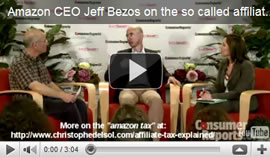
In 2010, Colorado legislation introduced an “Advertising Tax” Bill (HB-1193). Since the original bill would have forced me to move out of state, I had to learn more about this issue. Ultimately, Colorado affiliates successfully got the “affiliate” part removed from the law and I was able to stay, but let me tell you; most of what you hear about this bill is/was misleading or flat out lies.
I have read so much ignorance about these “Amazon tax” type bills (sometimes from people I like) that it literally pains me, so I decided to write this summary of it and hope it will help remove some of the demagogy surrounding it. Please read the article fully before voicing your opinion. This piece is not about being a Republican or Democrat. It is about knowledge, comprehension and facts.
1) What is the issue?
States are trying to force out-of-state merchant to collect sales taxes for internet purchases. To establish an argument for this, they are trying to say that because those out-of-state merchants have internet ‘affiliates’ in their states they, must collect the sales taxes.
2) Current legal situation and laws.
Four Important facts establish the current situation:
a) Our politicians at the federal level have been avoiding the issue by simply saying sales on the internet will not be taxed until we do something about it. Taxing internet sales at the federal level is probably the most logical way to do this, from both from a legal and logistic perspective.
 b) The only explicit legal ruling we have, as of today, is the 1992 Quill Corp. v. North Dakota Supreme Court case. The Supreme Court ruled that since Quill did not have a physical presence in North Dakota (i.e. PC terminals and regular shipping of inventory software into the state did not constitute physical presence), Quill should not be responsible for the collection of the sales tax.
b) The only explicit legal ruling we have, as of today, is the 1992 Quill Corp. v. North Dakota Supreme Court case. The Supreme Court ruled that since Quill did not have a physical presence in North Dakota (i.e. PC terminals and regular shipping of inventory software into the state did not constitute physical presence), Quill should not be responsible for the collection of the sales tax.
c) The other concept that helped me understand how things work is the Commerce Clause of the United States Constitution. This basically gives the federal government authority to avoid inter-state commerce wars (amongst many other things). For example, State’s imposing duties on out-of-state vendors that it does not even impose on its own vendors.
d) The last point can be summarized by stating “taxation without representation” should be avoided. This might seem political but it is not. If someone can tax you, and you have no voting rights regarding those taxes or even that state, this will lead to abuse. Most small businesses cannot financially afford to have a tax liability in the 49 other states. One single tax audit gone wrong in a far away state could devastate most small businesses. Imagine a small business in Hawaii having an audit or a tax dispute with the state of New York. They might generate huge travel costs and out of state lawyer fees, forcing them into bankruptcy.
3) Where are we today?
Today the states are facing unprecedented budget shortfalls so they are trying all possible ways to raise revenue. One idea that originated in New York is to use the fact that some of these out of state merchants have internet Affiliates that live in New York to force them to collect sales tax. The reality is the rapport between a merchant an affiliate is a virtual handshake. It can be broken in seconds. 
That fact that those affiliates live in New York contributes in no way to the affiliates sales that are generated via internet websites. When an affiliate makes a sale via her blog, her place of residence has no relevance to that sale. She could be living in the Bahamas or even France. These desperate laws are trying to say where she happens to live does matter, with all the grave implications it leads to (mostly that a mom-and-pop merchant would have tax collection liabilities in every 50 local states courts, since those affiliates would constitute physical presence in each state).
Because even law makers do not understand this, merchants simply fire all their affiliates in those states and still do not collect any sales taxes for those states. There are plenty of affiliates in other states or even countries that will gladly pick up the sales of those fired affiliates. Most merchants already have hundreds of affiliates in all 50 states or even in foreign countries. Affiliates compete fiercely between each other so affiliates from other states or countries will gladly pick up the sales.
4) Some major misconceptions you will hear all the time:
– These laws are sometimes called the “Amazon Tax“.
It is not only about Amazon. Amazon might actually be the company that can handle this complexity the best. Politicians like to call this the Amazon Tax because Amazon represents big business and it is easy to get people angry at big business. The truth is small internet retailers are hurt a lot more than Amazon. Additionally, many fail to see that lower prices for books and goods are a benefit to all Americans.
– Amazon is trying to avoid paying sales taxes.
First, the sales tax is actually paid for by the people, not the merchant. In Colorado, an elected representative recommended during a hearing that all the affiliates go into a different business; that being in the business of helping people avoid taxes would not last. This shows a gross and frightening misunderstanding of internet marketing and of the internet in general. Hearing his voiced ignorance first hand, and knowing he was in a position to make a decision about an entire industry he knew nothing about was a wakeup call for me about the reality of who our politicians really are.
Secondly, the merchant’s argument that simply having an internet affiliate in a given state does not constitute physical presence in that state seems to be correct. It’s basic logic no? (The 1992 Quill Corp. v. North Dakota Supreme Court case seems to establish this no?)
 – These laws attempt to force out-of-state merchants to collect sales taxes while they do not force their own in-state merchants to collect sales taxes for the other 49 states. In Colorado one of the most vocal lobbyists (the famous Denver Tattered Cover book store) is in favor of the “affiliate tax” law, and yet is itself not collecting taxes for other states. Nuts! Outrageous! This can be seen as an unfair inter-states action and might be illegal (i.e. Commerce Clause of the United States Constitution).
– These laws attempt to force out-of-state merchants to collect sales taxes while they do not force their own in-state merchants to collect sales taxes for the other 49 states. In Colorado one of the most vocal lobbyists (the famous Denver Tattered Cover book store) is in favor of the “affiliate tax” law, and yet is itself not collecting taxes for other states. Nuts! Outrageous! This can be seen as an unfair inter-states action and might be illegal (i.e. Commerce Clause of the United States Constitution).
– Did you know that in many states, the sales taxes are already owed by you!?

In those states, you should be paying those taxes to your state’s internal revenue service. In many cases these “affiliates laws” just underline the fact that those sales taxes are already owed by the citizens and they simply try to force out-of-state merchants to collect them because most people forget to pay those taxes. In other words, in many cases, these new laws are also a way to go after the citizens for not reporting and paying the sales taxes of all your online purchase.
I hope this information will help you understand more about this issue and cut through all the misleading information out there.
Reference:
http://en.wikipedia.org/wiki/Quill_Corp._v._North_Dakota
http://en.wikipedia.org/wiki/Commerce_Clause
An effort to do this the right way (at the federal level): Streamlined Sales Tax Governing Board

9 replies on “Affiliate Tax Bills Explained”
Being an Illinois resident, and new to the affiliate industry, this law gives me a headache. No matter how they try to justify and rationalize it, they are just finding another way to cut into our wages. Illionois has a 13 billion dollar deficit, so the politicians are looking for anyway (no matter how cheezy) to gain state revenue. Not to mention, during our previous Governor’s trial, Mr. R. Blagoivich, the FBI found Illinois to have one of the top 10 most corrupt governments. I know…not a prime state to move to if you are thinking of relocating.
Also, Iowa’s Governor is considering doing the same thing, and usually when one states adopts a law, the other follows. So Iowa affiliates can probably expect to deal with the same or similiar law within two years or less. I imagine many other states will be falling in line also.
Sorry to hear that. Florida was my exit strategy (bonus: no income tax) and a hop away from the Bahamas and other Caribbean islands.
All my compassion and best wishes of strength to you and all Illinois affiliates.
Thank you for sharing your article. I finally understand what is happening.
Thanks for clearing that up . actually florida was considering a similar tax last year and it got nixed. we have too many affiliates here and it would have hurt too much. yeh we dont pay income tax, but we buy lots of stuff here, and if you cut into our paycheck we don’t have any money to spend in the local economy.
Hi James, yes the same is happening in many states (even Texas). These laws are usually introduced by the democrats. They will probably not become law in states where the executive and legislative branches are in the hands of the republicans. Florida (and Texas) should be safe for now.
Last time I was in Miami I got a $410 speedings ticket, that is probably how they are making up for “no income tax”. Looks like they might be charging a lot for all the government services?
One thing no one is really addressing is how on earth are merchants supposed to tease apart sales from these states that only come from affiliates? If you want to give NY their tax money, you can’t tax ALL purchases from NY – because only a fraction come from affiliates! How do you figure that out without complex analytics in place? How would the state enforce that?
@Mida…
Good point.
These laws want to force the merchants to collect ALL sales taxes from ALL the residents of a given state, regardless if the purchase was made via an affiliate or not.
PS: These laws are just attempting to go around the “1992 Quill Corp. v. North Dakota” Supreme Court case by saying, affiliates constitute physical presence in a given state. Which anyone in our industry knows to be completely incorrect, since the affiliates place of residence has no correlation to the traffic on his website.
First comment-I wonder what the author’s credentials are. He sounds knowledgeable, and what he said sounds logical-but, just wondering if he has a background in taxes…For my part, I am an accountant who has worked in corporations my whole career. We always had to deal with sales tax.
The reality of things is that internet purchasing has created a HUGE volume of sales that are not readily traceable (and taxable) back to a particular location, or a specific taxpayer. So there are problems for the IRS because there are probably lots of sales that no one is paying income tax on. Then there are all of the states-each with their different rules regarding sales taxes. There are similarities in the states’ laws, but there is lots of inconsistency. The states are beginning to form coops and cooperate with one another. But rather than bring uniformity, the cooperation really results in MORE confusion.
Usually, whoever is the end user of a product is the one that owes sales or use tax. In practice, INDIVIDUAL end users of products purchased on the internet from outside the state of origin, are not paying sales taxes. But, COMPANIES that purchase items from out of state (unless they have an exemption or resale certificate, owe Sales or Use tax on the purchase. Businesses (in most states I have worked with) are obligated to review their purchases. If they have a resale certificate for product bought for resale, they would not have to pay any sales or use tax. But, If you sell lumber and you buy office supplies, you will need to self-assess and pay sales tax on your office supplies. Similarly, if you buy computers on-line for your lumber business, you will have to pay sales tax on that. (Obviously, some companies do NOT follow this law-much to their detriment if they go through an audit.) These types of rules apply in most states. Establishing some type of federal system for sales taxation would probably resolve several issues at one time.
Rebecca you are missing the main points of my article:
– Using the presence of affiliates to constitute nexus is silly. The state residence of an affiliate has no relevance to her internet activities. Many affiliates live abroad…
– State passing unilateral laws for out-of-state vendors to collect taxes for them when their own in-state merchants do not, defies basic logic and might be illegal.
Your response underlines how even people with an accounting background barely understand this issue. This might be why politicians can so easily demagog around this topic.
Hey, I’ve seen worth. Once during the political debates in Colorado, I’ve seen a respectable congressman (in his 70s?) accuse me and a room full of 150 affiliates of doing our jobs to help people avoid taxes. He suggested we go into a more legit line of business. LOL
The truth is most do not understand what affiliate marketing is. I hope that by reading my blog you will.